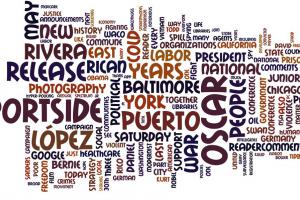Mass Surveillance
Scheer Post
 Reader Comments - California Oil Spill; Baltimore; Bernie Sanders Campaign; Waco and White Riot; Freedom for Oscar López Rivera - New York March May 30; Why Libraries Matter; Cold War Modernist;
Announcements - Last Cold War Spycase - film showing - Washington - June 7; National Healthcare Strategy Conference in Chicago Oct. 30
Today in History - The Paris Commune - 144 Years Ago; Today Marks 5 Years in Confinement for Chelsea Manning
Reader Comments - California Oil Spill; Baltimore; Bernie Sanders Campaign; Waco and White Riot; Freedom for Oscar López Rivera - New York March May 30; Why Libraries Matter; Cold War Modernist;
Announcements - Last Cold War Spycase - film showing - Washington - June 7; National Healthcare Strategy Conference in Chicago Oct. 30
Today in History - The Paris Commune - 144 Years Ago; Today Marks 5 Years in Confinement for Chelsea Manning
 Despite the volume of revelations, much of the public remains largely unaware of the true extent of the NSA's vast, highly aggressive and legally questionable surveillance activities. Given the vast amount of revelations about NSA abuses, it is somewhat surprising that just slightly more than a majority of Americans seem concerned about government surveillance. Which leads to the question of why?
Despite the volume of revelations, much of the public remains largely unaware of the true extent of the NSA's vast, highly aggressive and legally questionable surveillance activities. Given the vast amount of revelations about NSA abuses, it is somewhat surprising that just slightly more than a majority of Americans seem concerned about government surveillance. Which leads to the question of why?
 “I don’t believe that law enforcement has an absolute right to gain access to every way in which two people may choose to communicate,” said Marc Zwillinger, “And I don’t think our Founding Fathers would think so, either. The fact that the Constitution offers a process for obtaining a search warrant where there is probable cause is not support for the notion that it should be illegal to make an unbreakable lock. These are two distinct concepts.”
“I don’t believe that law enforcement has an absolute right to gain access to every way in which two people may choose to communicate,” said Marc Zwillinger, “And I don’t think our Founding Fathers would think so, either. The fact that the Constitution offers a process for obtaining a search warrant where there is probable cause is not support for the notion that it should be illegal to make an unbreakable lock. These are two distinct concepts.”
There are very few government checks on what America’s sweeping surveillance programs are capable of doing. John Oliver sits down with Edward Snowden to discuss the NSA, the balance between privacy and security, and dick-pics.
Spread the word